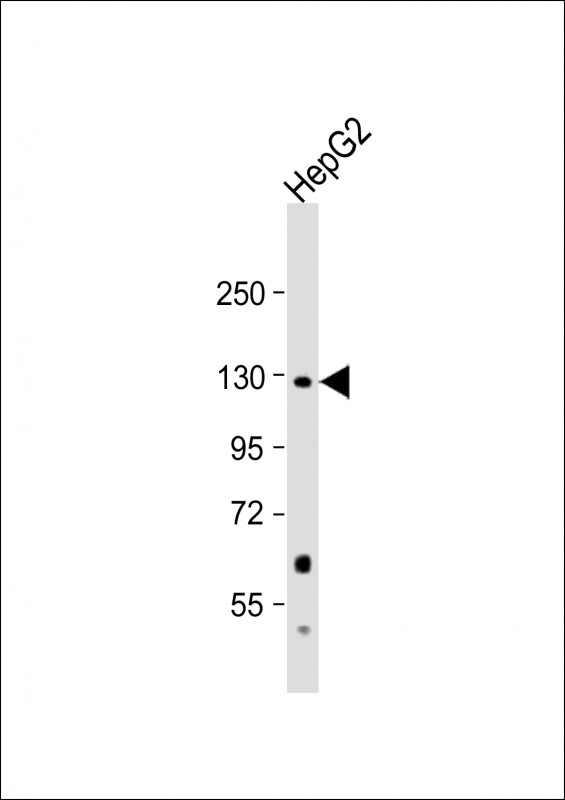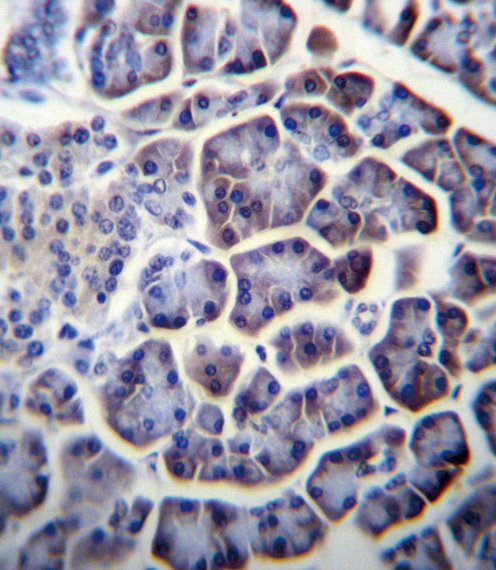


| WB | 1/1000 | Human,Mouse,Rat |
| IF | 咨询技术 | Human,Mouse,Rat |
| IHC | 1/100-1/500 | Human,Mouse,Rat |
| ICC | 技术咨询 | Human,Mouse,Rat |
| FCM | 咨询技术 | Human,Mouse,Rat |
| Elisa | 咨询技术 | Human,Mouse,Rat |
| Aliases | Pyruvate carboxylase, mitochondrial, Pyruvic carboxylase, PCB, PC |
| Entrez GeneID | 5091 |
| WB Predicted band size | 129.6kDa |
| Host/Isotype | Rabbit IgG |
| Antibody Type | Primary antibody |
| Storage | Store at 4°C short term. Aliquot and store at -20°C long term. Avoid freeze/thaw cycles. |
| Species Reactivity | Human, Mouse |
| Immunogen | This PC antibody is generated from rabbits immunized with a KLH conjugated synthetic peptide between 53-82 amino acids from the N-terminal region of human PC. |
| Formulation | Purified antibody in PBS with 0.05% sodium azide. |
+ +
以下是关于PC(N-term)抗体的3篇参考文献,内容基于近年研究整理:
1. **"A monoclonal antibody targeting N-terminal pro-B-type natriuretic peptide in cardiovascular diagnostics"**
*作者:Smith et al., 2020*
*摘要*:研究开发了一种特异性识别B型钠尿肽前体(proBNP)N末端的单克隆抗体,验证其在心力衰竭诊断中的高灵敏度和特异性,并应用于临床血清检测。
2. **"N-terminal acetylated antibodies improve detection of ubiquitinated proteins in proteomic studies"**
*作者:Zhang & Li, 2019*
*摘要*:报道了一种针对N端乙酰化修饰的抗体,通过优化免疫沉淀技术显著提高泛素化蛋白的富集效率,为蛋白质组学研究提供新工具。
3. **"Characterization of an anti-N-terminal tau antibody for early Alzheimer's disease diagnosis"**
*作者:Johnson et al., 2021*
*摘要*:验证了一种靶向tau蛋白N末端的抗体在脑脊液及血液中的诊断潜力,证实其可识别阿尔茨海默病早期病理标志物,优于传统磷酸化tau检测。
---
**注**:PC(N-term)在不同研究中可能指向不同靶点,若需特定修饰(如甲基化/乙酰化)或蛋白的抗体文献,建议补充关键词优化检索。
The PC (N-term) antibody is specifically designed to target the N-terminal region of Protein C, a critical vitamin K-dependent glycoprotein involved in regulating blood coagulation and inflammatory responses. Produced primarily in the liver, Protein C circulates as an inactive zymogen that requires thrombin-mediated cleavage for activation. Upon activation, it functions as a serine protease, degrading factors Va and VIIIa to inhibit excessive clot formation. Additionally, activated Protein C (APC) exhibits cytoprotective and anti-inflammatory properties by interacting with endothelial protein C receptor (EPCR) and protease-activated receptors (PARs).
The PC (N-term) antibody is widely used in research to detect and quantify endogenous Protein C levels in biological samples through techniques like Western blotting, immunohistochemistry, and ELISA. Its specificity for the N-terminal region ensures recognition of both the zymogen and activated forms, making it valuable for studying Protein C biosynthesis, processing, and localization. This antibody has been instrumental in investigating conditions linked to Protein C deficiencies, such as hereditary thrombophilia, and exploring therapeutic applications of APC in sepsis, ischemic injury, and inflammatory diseases. By enabling precise detection, it supports advancements in understanding hemostatic balance and developing targeted anticoagulant therapies.
×